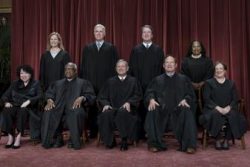
WASHINGTON (AP) – The Supreme Court has cleared the way for Idaho hospitals to provide emergency abortions for now in a procedural ruling that leaves key questions unanswered. Thursday’s ruling could mean the issue ends up before the conservative-majority court again soon. The ruling came after an opinion was briefly posted on the court’s website accidentally and quickly taken down, but not before it was obtained by Bloomberg News. The Biden administration had argued doctors must be allowed to provide emergency abortions when a pregnant patient’s health is at serious risk. But Idaho said its law does allow abortions to save the life of a pregnant woman and federal law doesn’t require wider exceptions.
The Supreme Court has rejected a nationwide settlement with OxyContin maker Purdue Pharma that would’ve shielded Sackler family members who own the company from civil lawsuits over the toll of opioids but also would’ve provided billions of dollars to combat the epidemic. The justices Thursday blocked an agreement hammered out with state and local governments and victims. The Sacklers would’ve contributed up to $6 billion and relinquished ownership of the company but kept billions more. The agreement provided that the Connecticut-based company would emerge from bankruptcy as a different entity, with its profits used for treatment and prevention. The high court had put the settlement on hold last summer, after the Biden administration objected.
The Supreme Court is putting the Environmental Protection Agency’s air pollution-fighting “good neighbor” plan on hold while legal challenges continue. It’s the conservative-led high court’s latest blow to federal regulations. The justices Thursday rejected arguments by the Biden administration and Democratic-controlled states the plan was cutting air pollution and saving lives in 11 states. The regulation will remain on hold while the federal appeals court in Washington considers a challenge to the plan from industry and Republican-led states. The rule is intended to restrict smokestack emissions from power plants and other industrial sources that burden downwind areas with smog-causing pollution. Energy-producing states Ohio, Indiana and West Virginia challenged it.
